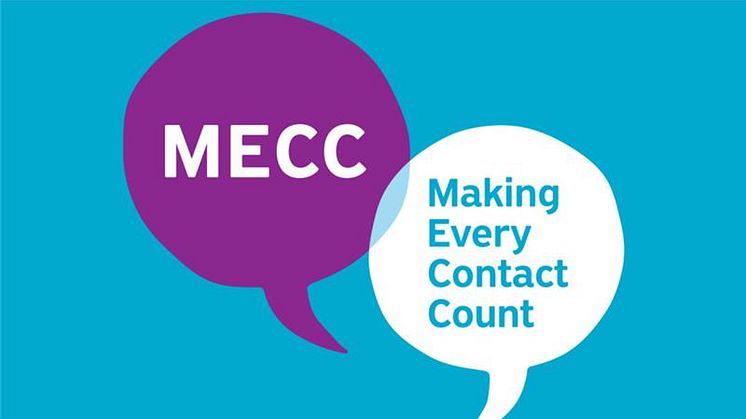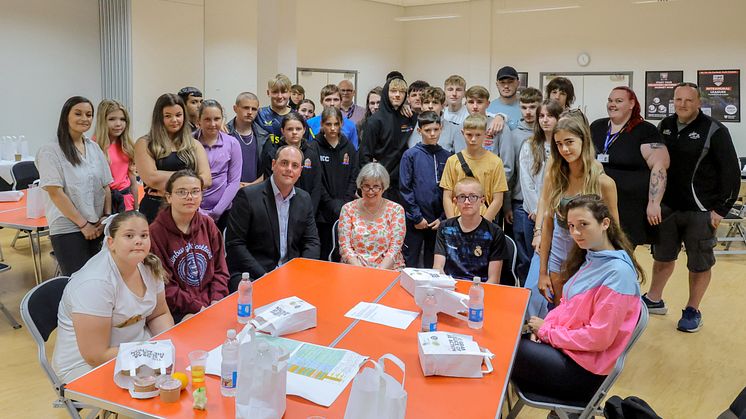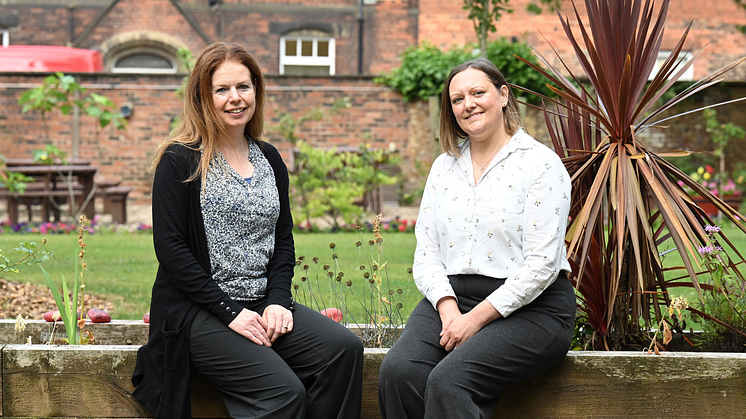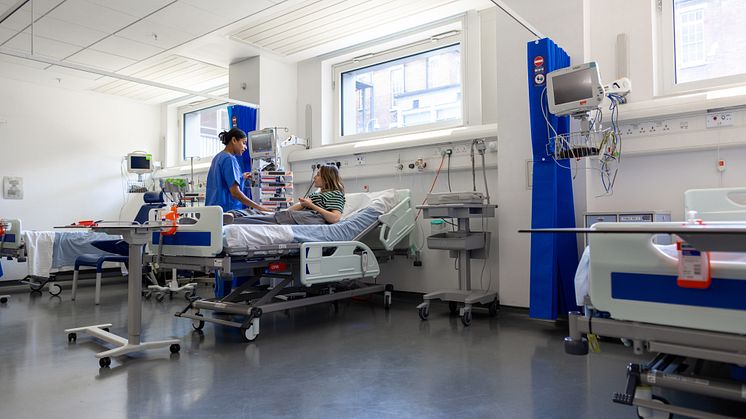
Press release -
New research to boost preventative healthcare in Bolton
A collaborative project evaluating the success of the Making Every Contact Count healthcare initiative across Bolton has secured almost £250,000 from the National Institute for Health and Care Research (NIHR).
Making Every Contact Count – known as MECC – is a nationally supported preventative healthcare approach, aiming to turn everyday conversations between professionals and members of the public into opportunities to promote healthier lifestyles – with a focus on smoking, physical activity, healthy eating, alcohol, and mental health.
Since 2024, Bolton NHS Foundation Trust and Bolton Council’s Public Health Team have been rolling out MECC across acute and community services. Early results show promising signs, with staff reporting greater confidence in supporting patients to make positive health changes.
Now, the new funding which has been awarded through NIHR’s Three Schools Prevention Programme will allow researchers, the Bolton NHS Foundation Trust and Bolton Council to work together with Greater Manchester community partners to analyse how MECC training helps local authority, health and social-care staff reduce entrenched health inequalities across Bolton, where 45% of residents live in highly deprived areas.
The lead academic partner in this practitioner-led study is Northumbria University – part of Fuse, the Centre for Translational Research in Public Health, working with experts from the University of Sheffield, the University of Oxford and LiLaC, via Lancaster University.
Together the universities represent the NIHR 'Three Schools', which consists of the Schools for Primary Care Research (SPCR), Public Health Research (SPHR) and Social Care Research (SSCR).
The partners will work together to evaluate how well MECC works in practice, how it affects staff and patients, and how it can be sustained and adapted across different settings.
The project builds on several years of research by Northumbria University’s Making Every Contact Count research group,led by Dr Angela Rodrigues, Associate Professor in Psychology at Northumbria University, in collaboration with Professor Katie Haighton Professor of Public Health & Wellbeing at Northumbria University.
Dr Rodrigues, academic lead on the project, and co-lead of the Behaviour Change Research Cluster in Fuse, said: “This funding provides a valuable opportunity to work alongside practitioners in Bolton at a pivotal point in their MECC journey. It means we can rigorously evaluate what’s working - and for whom - while helping shape future development.
“By learning from local delivery in its early stages, we can inform future effectiveness studies and support more targeted, impactful approaches to preventative healthcare. Ultimately, this work contributes to improving the health of communities who are often underserved, reducing risk of disease and premature mortality.”
Running until June 2027, the study will explore how confident and skilled staff feel using MECC following training; the effectiveness of MECC in different health and care settings; and the impact on patients’ health behaviours and experiences. The research will also evaluate MECC’s contribution to more equitable access to care and its long-term sustainability.
Using staff and patient interviews, surveys, training observations and health economic modelling, the research will provide an in-depth understanding of how MECC supports real-world behaviour change. Findings will inform future strategy both locally in Bolton and nationally across the NHS and public health systems.
Tyrone Roberts, Chief Nursing Officer at Bolton NHS Foundation Trust, said: "As healthcare professionals we're in a privileged position to try and make a positive difference in the lives of those we meet. Building trust and good connections is at the heart of that so we can approach difficult topics, such as weight, smoking or alcohol.
"Making Every Contact Count has empowered our staff by equipping them with skills and confidence to have new conversations with patients about self-care and signpost them to the right help, which might even be outside of their everyday role.
"We're proud of our MECC journey since launching in early 2024. We have seen staff confidence levels increase when it comes to having those difficult conversations with patients and through delivering this as one Bolton system we have strengthened our connections with colleagues at Bolton Council."
Lynn Donkin, Director of Public Health for Bolton Council, added: “We are pleased to be working with NIHR academic colleagues to evaluate our partnership approach to Making Every Contact Count in Bolton, so we can strengthen this approach and work together to better support people in our local communities.”
Dr Christian Morgner, Senior Lecturer at the University of Sheffield will lead on Equality, Diversity & Inclusion aspects of the project and brings specialist insight on social-care contexts, ensuring the evaluation reaches underserved communities and that learning is transferable nationwide.
Dr Morgner added: “The project offers an integrated model of a real-world laboratory. By embedding robust EDI principles, we’ll generate evidence that works for every neighbourhood.”
In addition to the Bolton-focused MECC study, Northumbria academics are leading further NIHR-funded research to map out a strategy for MECC training in the voluntary sector, where its implementation is much less established than in NHS and local authorities’ workforces.
Dr Beth Nichol’s NIHR Three Schools post-doctoral Fellowship will see Portsmouth City Council, the University of Sheffield, the University of Oxford, Lancaster University and Queen Mary University of London working in collaboration with charities and community groups to develop a blueprint for establishing the MECC approach in the voluntary sector. Supervision is provided by a collaborative team, with Professor Katie Haighton and Dr Angela Rodrigues at Northumbria University taking lead supervisory roles.
Northumbria is one of the top-rated universities for health care programmes in the UK, and is dedicated to reducing health and social inequalities, contributing to the regional and national workforce and improving social, economic and health outcomes for the most marginalised in society. Through its new Centre for Health and Social Equity, known as CHASE, researchers will be delivering world-leading health and social equity research and creating innovative, evidence-based policies and data-driven solutions to bring impactful change across the region, the UK and globally.
Ends
Please contact media.communications@northumbria.ac.uk with any media enquiries or interview requests
About Northumbria University
Northumbria is a research-intensive university that unlocks potential for all, changing lives regionally, nationally and internationally. Named Modern University of the Year 2025 by The Times and The Sunday Times, Northumbria is based in Newcastle upon Tyne, with an additional campus in London.
Two thirds of Northumbria's undergraduate students come from the North East region and go into employment in the region when they graduate, demonstrating Northumbria's significant contribution to social mobility and levelling up in the North East of England.
Find out more about us at www.northumbria.ac.uk
About the Making Every Contact Count research group at Northumbria University
The MECC research group at Northumbria University brings together interdisciplinary experts from both academia and practice in the fields of Psychology, Social Work, Public Health, Business, Sports and Exercise and Health and Social Care across the North East of England with the shared aim of advancing the evidence base for MECC.
The group, led by Dr Angela Rodrigues, has strong links with Fuse and the ARC NENC and works with fellow academics at the other North East Universities along with relevant stakeholders from the NHS and Local Authorities including the regional MECC multi-agency strategy group. Find out more about Northumbria’s Making Every Contact Count Research Group.
About the NIHR
The mission of the National Institute for Health and Care Research (NIHR) is to improve the health and wealth of the nation through research.
We do this by:
- funding high quality, timely research that benefits the NHS, public health and social care
- investing in world-class expertise, facilities and a skilled delivery workforce to translate discoveries into improved treatments and services
- partnering with patients, service users, carers and communities, improving the relevance, quality and impact of our research
- attracting, training and supporting the best researchers to tackle complex health and social care challenges
- collaborating with other public funders, charities and industry to help shape a cohesive and globally competitive research system
- funding applied global health research and training to meet the needs of the poorest people in low and middle income countries
NIHR is funded by the Department of Health and Social Care.
Our work in low and middle income countries is principally funded through UK international development funding from the UK government.
About the NIHR Three Schools Prevention Research Programme
The NIHR Three Research Schools have been awarded £10m of funding, hosted by SPHR to deliver a programme of prevention research from 2023–2027. The programme aims to develop, evaluate and understand how to implement interventions which promote health and wellbeing, treat conditions early, and manage health problems to prevent severe disease. Find out more.
About Fuse, the Centre for Translational Research in Public Health
Fuse brings together six Universities in North East England and North Cumbria (Durham, Cumbria, Newcastle, Northumbria, Sunderland and Teesside) in a unique collaboration to deliver world-class research to improve health and wellbeing and tackle inequalities. Fuse is a founding member of the NIHR School for Public Health Research (SPHR).
Topics
Categories
UNIVERSITY OF THE YEAR 2022 (Times Higher Education Awards)
Northumbria is a research-intensive university that unlocks potential for all, changing lives regionally, nationally and internationally.
Two thirds of Northumbria's undergraduate students come from the North East region and go into employment in the region when they graduate, demonstrating Northumbria's significant contribution to social mobility and levelling up in the North East of England.
Find out more about us at www.northumbria.ac.uk
--- Please contact media.communications@northumbria.ac.uk with any media enquiries or interview requests ---









